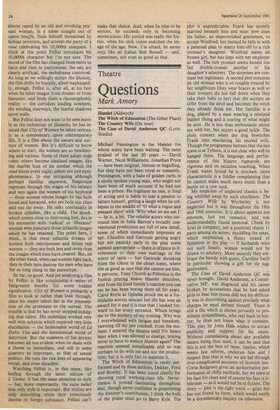Theatre
uestions
Mark Amory
Hamlet (Aldwych) The Witch of Edmonton (The Other Place) The Country Wife (On tour) The Case of David Anderson QC (Lyric Studio) Michael Pennington is the Hamlet for whom many have been waiting. The most praised of the last 20 years — David Warner, Nicol Williamson, Jonathan Pryce — have been original, intense or beguiling, but they have not been royal or romantic. Pennington, with a halo of golden curls, is a nicely spoken young man, who might not have been of much account if he had not been a prince. He frightens no one, is fond of acting and is liable to tear a passion to tatters himself, getting a laugh when he collapses in the middle of '0 what a rogue and peasant slave' with 'Why what an ass am I' — he is, a bit. The reliable actors who surround him in John Barton's broadly conventional production are full of new detail, some of which immediately impresses as apt. Claudius and Gertrude getting angry but not panicky early in the play scene seemed appropriate — there is offence in it: references to their own marriage in the worst of taste — but Gertrude shrinking from the Ghost in the closet scene, where she as good as says that she cannot see him, is perverse. Tony Church as Polonius is the foolish prating knave Hamlet describes, and from his fond family's reaction you can see he has been boring them all for years. Carol Royle as Ophelia struck me as a formidable actress miscast but she has won an award for it and it is true that I looked forward to her every entrance. Which brings me to the mystery of my evening. Why was I overwhelmed with fatigue and boredom, yawning till my jaw cracked, from the moment I entered the theatre until 33/4 hours later when I was allowed to emerge, hoping never to have to endure Hamlet again? The reaction seemed inexplicable and so was perhaps to do with me and not the production; but it is only fair to mention it.
The Witch of Edmonton is rarely performed and by three authors, Dekker, Ford and Rowley. It has been noted chiefly for showing rural working-class life. Nevertheless it proved fascinating throughout and, though never confident in pinpointing the director's contribution, I think the bulk of the praise must go to Barry Kyle. The plot is unpredictable. Frank has secretly married beneath him and must now coax his father, an impoverished gentleman, to accept Winifred; but instead he falls in with a paternal plan to marry him off to a rich yeoman's daughter. Winifred seems an honest girl, but has slept with her employer as well. The rich yeoman seems honest too but double-crosses another of his daughter's admirers. The surprises are constant but legitimate. A second plot concerns an old woman who is so roughly treated by her neighbours (they wear braces as well so their trousers do not fall down when they take their belts to her) that she accepts an offer from the devil and becomes the witch they already think her. Her familiar is a dog, played by a man wearing a minimal leather thong and a coating of what might be soot. He is less than enthusiastic about sex with her, but enjoys a good tickle. The plots connect when the dog bewitches Frank into murdering his second wife. Though the programme betrays that the last scene is at Tyburn, it is not clear who will be hanged there. The language and performance of this bizarre rigmarole are vigorous and on occasion touching. When Frank waxes lyrical he is mocked; more characteristic is a fiddler complaining that he cannot make much more music than a beetle on a cow turd.
My suspicion of neglected classics is being whittled away by such excellence. The Country Wife by Wycherley is not neglected but it was throughout the 18th and 19th centuries. It is about appetite not emotion, lust not romance, and was understandably found immoral. Cheek by Jowl (a company, not a position) shares 11 parts among six actors, muddling the sexes, which emphasises a flimsy strand of feminism in the play — if husbands were not such beasts, women would not be drawn to adultery. More securely they embrace the bawdy with gusto, Caroline Swift in particular showing a gift for sly suggestiveness.
The Case of David Anderson QC was never brought. David Anderson, a Conservative MP, was disgraced and his career broken by accusations that he had asked girls to beat him (none did) but his difficulty was in discovering against precisely what charges he must defend himself. There is still a file which is shown privately to prominent sympathisers, who reel back in horror; he does not know what it contains. This play by John Hale wishes to attract publicity and support for his cause. Without complaining about any available means being thus used, it can be said that this is not the best of them. Justice, which wants law reform, endorses him and I suspect that that is why we are led through over-complicated accounts of Scottish law. Corin Redgrave gives an authoritative performance of chilly rectitude, but we stare at his face for clues and of course his face is irrelevant — as it would not be in fiction. The story ____ plot is the right word — grips but has not found its form, which would surely be a documentary inquiry on television.


































 Previous page
Previous page